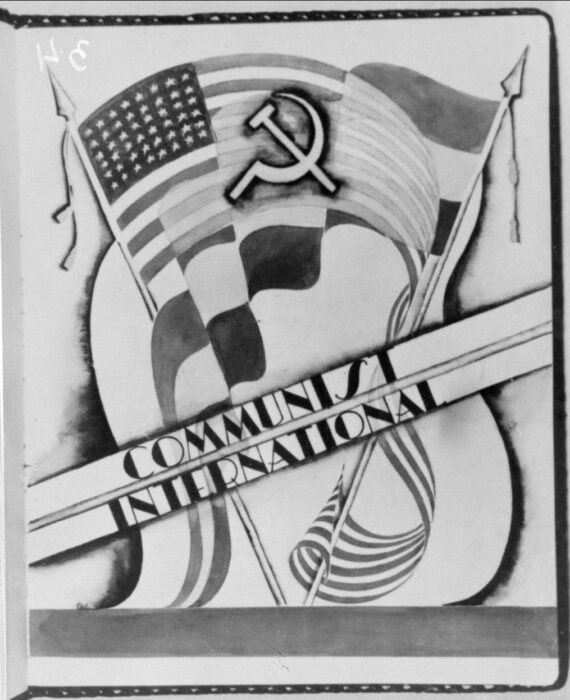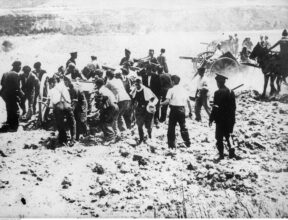From July 1936 to April 1939, the Spanish Republican government waged a war against the fascist forces led by dictator and general Francisco Franco. Twenty-seven nations quickly signed an alliance pledging non-intervention. The United States adopted a position of non-intervention as well, although unofficially. At the same time, Mussolini and Hitler aided Franco with huge numbers of soldiers and military equipment.
The Spanish Republican government would have been left on its own if not for the spirit of solidarity that the war induced in thousands of citizens of many nations around the world, a sentiment promoted by the USSR which materialized in the International Brigades. Out of a total of 35,000 volunteers approximately 2,800 were American: men and women that answered the solidarity call of the Republic and joined the war against fascism. Although Americans were employed in different battalions and units, they are collectively known as the Abraham Lincoln Brigade.
Shortly after the beginning of the war the Comintern (an international organization that advocated world communism), started to ideate the creation of the International Brigades. Together with a number of internationals who were already in Spain after the government organized parallel games to boycott the Nazi 1936 Olympics, they were the first to form international battalions. Shortly after, the Comintern, in collaboration with dozens of Communist Parties around the world, started working on the arrival of more volunteers.

Illustration form the XV Brigade Book (RGASPI archive)
A day after Christmas, on December 26th, 1936, the French ocean liner SS Normandie carried the first American volunteers to the coasts of France to go on to the battle front in Spain. A few months after the first contingent of Americans arrived things got harder; while the U.S. government tacitly prohibited citizens to fight in Spain, the naval force of Hitler arrived to guard the Atlantic ocean and the Mediterranean sea from any foreign intervention. Regardless, the spirit of anti-fascist solidarity of the American volunteers remained strong. Whether people had to hide as stowaways on the ships or had to travel to Spain in even more unconventional ways, they continued their journey across the Atlantic up until the dissolution of the International Brigades in October of 1938.
Once they left the port of, most often New York, it took approximately two weeks to cross the Atlantic. An account of the trip by African American volunteer Vaughn Love remembered it as a quiet scene, where few or none knew each other and where the general sentiment was of cautiousness and ignorance of what was to come. In general, volunteers were white males with a blue collar jobs, with a predominantly European migrant background. Most of them were affiliated with the Communist Party USA (CPUSA) or other communist organizations.
The first American volunteers formed the Lincoln Battalion which was part of the XV International Brigade. The “fifteenth” or “la quince” in Spanish, as it was popularly known, consisted mostly of volunteers from various English-speaking countries like the U.S., Canada and the United Kingdom. Their first interaction with enemy forces happened in February 1937 about sixteen kilometers from Madrid. Known as the Battle of Jarama it was one of the most deadly of the war, and particularly for the recently created brigades who lost around 2500 international volunteers over the period of just three weeks.

Battle ground near Jarama
The Lincoln Battalion lost about two thirds of its volunteers in the Battle of Jarama, which meant the need for more American recruits. These new American volunteers formed the Washington Battalion, a new unit created after the heavy losses at Jarama. The Lincoln Brigade still participated in many battles during the Spanish Civil War. Most notably was its participation in the Aragon Offensive and the battles of Belchite and Teruel. Ultimately, the superior strength of the fascist armies forced the then president of Spain, Negrin, to decommission the International Brigades, hoping this would also secure an international peace agreement.
The International Brigades paraded through Barcelona and said their final goodbyes to the Spanish people in the fall of 1938. Dolores Ibarruri, known as “La Pasionaria” who had become an icon of anti-fascist fighting remembered the role of the international volunteers in her farewell address to the International Brigades:
“We shall not forget you; and, when the olive tree of peace is in flower, entwined with the victory laurels of the Republic of Spain — return!
“Return to our side for here you will find a homeland — those who have no country or friends, who must live deprived of friendship — all, all will have the affection and gratitude of the Spanish people who today and tomorrow will shout with enthusiasm —
Long live the heroes of the International Brigades!”
 Dario Graziano from Spain is a student in Transatlantic Studies at Radboud University. He has previously completed a master in American Studies in the University of Amsterdam and bachelor in History at the University of Zaragoza. During his bachelor years, he also had the chance to study abroad in countries such as the U.S., Italy or Romania, which have made him specially interested in transnational movements and perspectives. His main research interest are the African Americans who fought in the Abraham Lincoln Brigade during the Spanish Civil War. Recently, he published a blog about this topic on lavozdelbrigadista.com (in Spanish).
Dario Graziano from Spain is a student in Transatlantic Studies at Radboud University. He has previously completed a master in American Studies in the University of Amsterdam and bachelor in History at the University of Zaragoza. During his bachelor years, he also had the chance to study abroad in countries such as the U.S., Italy or Romania, which have made him specially interested in transnational movements and perspectives. His main research interest are the African Americans who fought in the Abraham Lincoln Brigade during the Spanish Civil War. Recently, he published a blog about this topic on lavozdelbrigadista.com (in Spanish).
(top image: Tom Mooney Company from the Lincoln Battalion. Jarama, c. 1937, unknown photographer)



